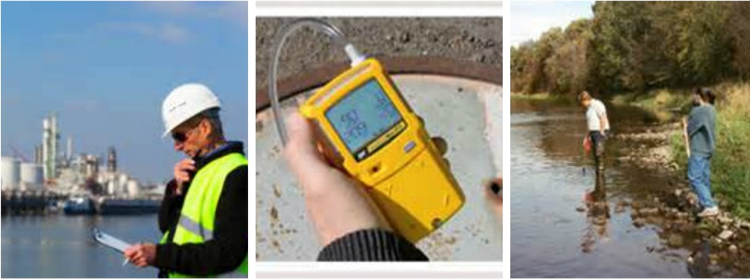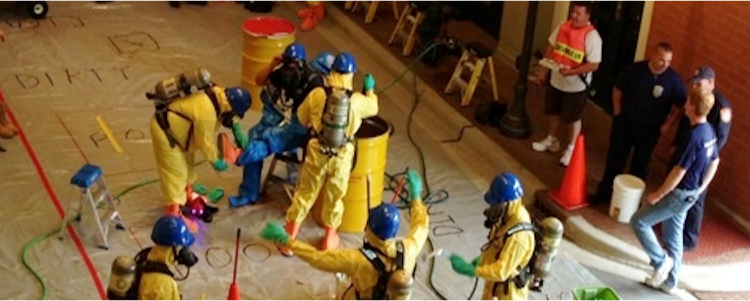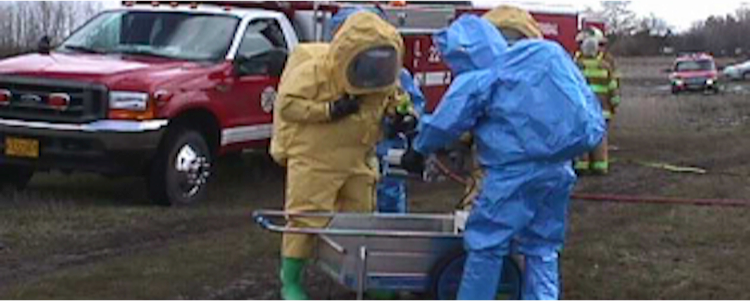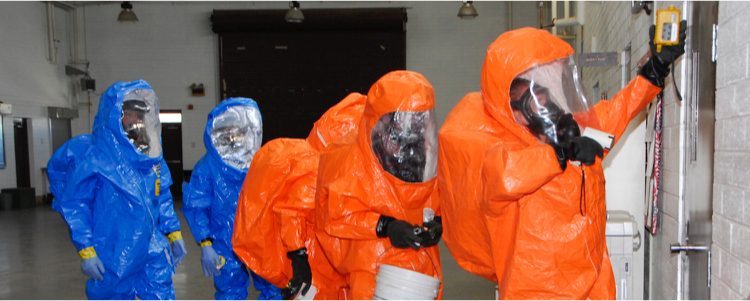Back to Public Admin Open CourseWare
Preview Online Program: NSC Environmental Technology Program
Audience: Instructional designers, Industry training and students
The National STEM Consortium academic certificate in Environmental Technology is built on a 30-semester-credit model and includes two tracks: (1) HazMat, Safety, and Health, and (2) Water Quality. Graduates have the opportunity to earn nationally recognized federal certificates from the Environmental Protection Agency (EPA) and the Occupational Safety and Health Administration (OSHA) and are prepared for positions focusing on environmental issues, laboratory and field tests, and workplace safety. All of the courses underwent a thorough review by industry subject matter experts.
Subject Matter Expert Review ![]()
SME Review: Environmental Technology Certificate Program
Program Guide ![]()
NSC Environmental Technology Program
Courses In This Program
Introduction to Environmental Science

Introduction to Environmental Science is intended as a first college-level science course. It is designed to equip students with the knowledge and skills to evaluate scientific problems in environmental science and related fields, and to gain appreciation for the structure and function of the environment as it relates to human activities. This course consists of 13 lessons along with corresponding quizzes, homework, and classroom activities.
Preview Online Course: Introduction to Environmental Science
Download Materials: Introduction to Environmental Science
Environmental Compliance

Environmental Compliance is a study of how environmental compliance with hazardous waste law is achieved at federal, state, and local program. Embedded into this course is the Resource Conservation and Recovery Act (RCRA) Hazardous Waste Generator certification. Resources for delivering this certification, including both an instructor guide and a student manual, are included in the Certification Course Tools folder of this teaching toolkit.
Preview Online Course: Environmental Compliance
Download Materials: Environmental Compliance
Environmental Sampling Procedures

Environmental Sampling Procedures emphasizes the practical aspects of environmental sampling, and includes the US EPA-issued Air Monitoring for Emergency Response (AMFER) certificate upon completion of the course. Students will be taught the basic principles of properly collecting, analyzing, and interpreting the results of air, aqueous, and solid environmental samples in a safe and efficient manner. Students will gain hands-on experience in the following areas: laboratory equipment decontamination, calibration and maintenance; field survey techniques; and sample collection and analysis.
Preview Online Course: Environmental Sampling Procedures
Download Materials: Environmental Sampling Procedures
Regulatory

Regulatory offers an overview of occupational and environmental regulation development and implementation. Students will study past and present environmental legislation with an emphasis on its application to hazardous materials. Topics include: major pieces of environmental legislation, their historical bases, how they are implemented, and how they affect environmental issues. A 16-hour Environmental Law certification is embedded into this course.
Preview Online Course: Regulatory
Download Materials: Regulatory
Industrial Hygiene and Lab

Industrial Hygiene and Lab is designed to introduce students to industrial hygiene as it relates to the anticipation, recognition, evaluation, and control of hazards in the workplace. The course emphasizes the chemical and physical hazards that can lead to occupationally related diseases, and includes weekly lab exercises. Topics include: historical basis for industrial hygiene, current legislation, principles of epidemiology, industrial toxicology, exposure standards, and respiratory protection. Embedded in this course are a 4-Hour Hazard Recognition Certification, and an 8-Hour Respiratory Protection Certification. The classroom (3 semester credits) and lab (1 semester credit) portions of Industrial Hygiene share the same learning outcomes and are packaged together as a single 4-credit course for convenience. However, they can also be delivered as separate courses.
Preview Online Course: Industrial Hygiene and Lab
Download Materials: Industrial Hygiene and Lab
Hazardous Materials and Lab

Hazardous Materials and Lab are designed for personnel involved with the investigation and remediation of uncontrolled hazardous waste sites and, to a lesser extent, response to an accident involving hazardous materials. The course set meets the U.S. Occupational Safety and Health Administration’s requirement (29 CFR 1910.120(e)(3)(i)) of a minimum of 40 hours of classroom safety training for hazardous waste site workers, and includes weekly lab exercises. After completing these courses, participants will be more knowledgeable of hazardous waste operations, team functions, personnel health and safety procedures, and operation of field monitoring equipment.
The classroom (3 semester credits) and lab (1 semester credit) portions of Hazardous Materials and Lab are packaged together as a 4-credit set for convenience, since both portions are required to complete the 40-hour HAZWOPER certification. However, they easily can be delivered as separate courses, and adopting colleges are encouraged to program according to their local needs.
Preview Online Course: Hazardous Materials and Lab
Download Materials: Hazardous Materials and Lab
Hazardous Materials Technician

Hazardous Materials Technician designed for personnel involved with the investigation and remediation of hazardous material spills. Students will learn how to handle an emergency response to the release of a hazardous material. Topics include: hazard recognition, toxicology, respiratory protection, personal protective clothing and equipment, spill control, decontamination, and understanding of the Incident Command System (ICS). This is an introductory course to hazardous materials response, and includes a 24 contact-hour Hazardous Materials Technician certification.
Preview Online Course: Hazardous Materials Technician
Download Materials: Hazardous Materials Technician
Hazardous Materials Risk Analysis

Hazardous Materials Risk Analysis presents a systematic method for analyzing risks associated with hazardous materials. This type of analysis might be done as part of a planning operation, or at the scene of an incident involving hazardous materials. Students will be able to identify the essential minimum resources needed to analyze risks at hazardous materials releases. Embedded in this course are four Emergency Management Institute certificates of achievement: IS-00100 (Introduction to Incident Command System), IS-00200 (Incident Command System for Single Resources and Initial Action Incidents), IS-00700 (Introduction to National Incident Management System), and IS-00800.B (National Response Framework).
Preview Online Course: Hazardous Materials Risk Analysis
Download Materials: Hazardous Materials Risk Analysis
Introduction to OSHA

Introduction to Occupational Safety and Health Administration (OSHA) covers the OSHA standards and regulations to supplement an ongoing workplace safety and health program. It identifies common violations of OSHA standards and appropriate abatement procedures for selected safety hazards. Students will also learn the requirements of general material handling and storage, combustibility issues of flammable materials, and handling and storage of non-compatible materials. In addition, lessons will provide instruction on the conditions, operations and circumstances of fall protection systems and practices. This course includes the OSHA 30-hour General Industry Safety and Health content covered in Module 1. Attendance is mandatory to all Module 1 class sessions to earn the 30-hour course completion card.
Preview Online Course: Introduction to OSHA
Download Materials: Introduction to OSHA
Introduction to Water Resources

Introduction to Water Resources is an introduction to hydrology and water policy, intended for students seeking employment in a field related to water quality. Students will learn about the significance of water resources both to people and to ecosystems, how water quality is measured, and how water policy determines how water is used. Students will also become familiar with scientific techniques and the interaction between policy and science.
Preview Online Course: Introduction to Water Resources
Download Materials: Introduction to Water Resources
Chemistry and Biology of Natural Waters

Chemistry and Biology of Natural Waters is an introduction to Stream and Lake Ecology with an emphasis on aquatic ecosystem features and functions related to nutrient cycling. It is intended as an introductory course for students interested in a career in water chemistry or environmental monitoring. The course consists of 15 lessons along with corresponding labs and assessments. Students will gain experience with limnology field techniques through regular field visits to collect and analyze stream and lake samples.
Preview Online Course: Chemistry and Biology of Natural Waters
Download Materials: Chemistry and Biology of Natural Waters
Field Work

Field Work is designed to equip students with the knowledge and skills to evaluate scientific problems in environmental science and related fields, and to gain appreciation for the structure and function of the environment as it relates to human activities.
Preview Online Course: Field Work
Download Materials: Field Work
